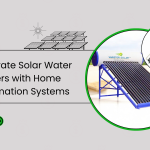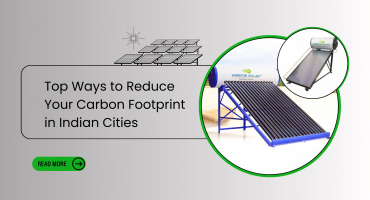
Varistor Solar is dedicated to empowering individuals, businesses, and communities with the transformative power of solar energy. We believe in a brighter, cleaner future and are committed to making sustainable living accessible to everyone.
+91-9113690456
Email: sales@varistorsolar.com
Varistor Solar
NO 40/C, KALKERE VILLAGE,12TH MAIN, NRI LAYOUT,Ramamurthy Nagar, Bangalore North,Bangalore- Karnataka, 560016
Solar water heaters are an increasingly popular choice for homeowners seeking to reduce energy bills and minimize their environmental footprint. This comprehensive guide will walk you through how a solar water heater function, from the basics to detailed insights, ensuring you understand every aspect.

Table of Contents
- Introduction to Solar Water Heaters
- How Solar Water Heater Function
- Types of Solar Water Heaters
- Components of a Solar Water Heating System
- Installation and Maintenance
- Costs and Savings
- Choosing the Best Solar Water Heater
- Common FAQs
Introduction to Solar Water Heaters
Harnessing the Power of the Sun
Solar water heaters, also known as solar hot water panels, use the sun's energy to heat water for domestic use. This eco-friendly technology can significantly reduce electricity or gas consumption, making it a smart choice for energy-conscious consumers.
The Growing Popularity
In regions like Bangalore and Kerala, where sunlight is abundant, the adoption of solar water heaters has been rapid. Many homeowners and businesses are opting for this sustainable solution to meet their hot water needs.
How Solar Water Heaters Work
The Basics of Solar Water Heating
At its core, a solar water heating system captures sunlight and converts it into heat energy, which is then used to warm water. This process involves a few key steps:
- Solar Collectors: These are the solar hot water panels that absorb sunlight.
- Heat Transfer Fluid: Often water or an antifreeze solution, this fluid carries the heat.
- Heat Exchanger: Transfers the absorbed heat to the water in the storage tank.
- Storage Tank: Stores the hot water until it's needed.
Detailed Functioning
- Solar Collectors: Positioned on rooftops or open spaces, these panels absorb solar radiation. The most common types are flat-plate collectors and evacuated tube collectors.
- Heat Transfer: The absorbed heat is transferred to a fluid, which circulates through the collectors.
- Heat Exchange: The heated fluid passes through a heat exchanger, transferring its heat to the water in the solar water heater tank.
- Storage: The heated water is stored in an insulated tank until it is needed.
Key Terms
- Solar Panel Water Heater: Another term for solar water heaters, emphasizing the role of solar panels.
- Solar Water Heating System Information: Refers to the details and specifications of the solar heating setup.
Types of Solar Water Heaters
Active vs. Passive Systems
- Active Systems: Use pumps and controls to circulate the heat transfer fluid.
- Passive Systems: Rely on natural convection and gravity to move the fluid.
Direct vs. Indirect Systems
- Direct Systems: Circulate water directly through the solar collectors.
- Indirect Systems: Use a heat transfer fluid that circulates through the collectors and a heat exchanger.
Key Variations
- Integrated Collector-Storage Systems: Combine the collector and storage tank in one unit.
- Thermosiphon Systems: Utilize natural circulation of water based on temperature differences.
Components of a Solar Water Heating System
Solar Collectors
- Flat-Plate Collectors: Consist of a dark absorber plate beneath a transparent cover.
- Evacuated Tube Collectors: Made of rows of glass tubes with a vacuum between the inner and outer layers for better insulation.
Storage Tanks
- Solar Water Heater Tank: Stores hot water and maintains its temperature.
- Solar Water Heater 300 Ltr Price: The cost varies based on capacity and brand, typically higher for larger tanks.
Heat Exchangers
- Role and Function: Facilitate the transfer of heat from the fluid to the water.
- Materials: Usually made of copper or stainless steel for efficient heat transfer.
Control Systems
- Pumps and Controllers: Regulate the flow of the heat transfer fluid.
- Sensors and Valves: Monitor temperatures and control fluid movement.
Installation and Maintenance
Installing a Solar Water Heater
- Site Assessment: Evaluate the location for optimal sunlight exposure.
- Mounting the Collectors: Position and angle them for maximum efficiency.
- Connecting the System: Link the collectors, storage tank, and control systems.
Regular Maintenance
- Inspection: Regularly check for leaks and ensure the system is functioning properly.
- Cleaning Collectors: Remove any debris or dirt to maintain efficiency.
- Service: Find reliable solar water heater service near me for professional maintenance.
Costs and Savings
Initial Investment
- Solar Water Heater Price in Bangalore: Varies widely based on the system type and capacity.
- Solar Heater Price in Kerala: Often comparable to Bangalore, with regional variations.
Long-term Savings
- Energy Savings: Significant reduction in electricity or gas bills.
- Return on Investment: Typically recouped within a few years through energy savings.
Price Examples
- Solar Water Heater 25 Ltr Price: Suitable for small households or specific needs.
- 200 Liter Solar Water Heater Price: Common for medium-sized homes, offering a balance between capacity and cost.
- Best Solar Water Heater 200 Ltr Price: Reflects quality and brand reliability.
- Solar Water Heater Dimensions: Important for installation planning.
Choosing the Best Solar Water Heater
Factors to Consider
- Capacity Needs: Based on household size and hot water usage.
- Climate Suitability: Efficiency in your local weather conditions.
- Budget: Balancing initial cost with long-term savings.
Top Recommendations
- Best Solar Water Heater in India: Evaluate brands and models based on performance and reviews.
- Best Solar Water Heater in Bangalore: Consider local suppliers and installers.
- Varistor Solar: A trusted company name in the industry.
Additional Features
- Solar Water Heater with Electric Backup: Ensures hot water availability even on cloudy days.
- Mini Solar Water Heater: Compact solutions for specific needs.
Common FAQs
What is the lifespan of a solar water heater?
Most systems last 20 years or more with proper maintenance.
How much can I save with a solar water heater?
Savings depend on your local energy costs and usage, but many users see a 50-80% reduction in their hot water heating bills.
Are there government incentives for installing solar water heaters?
Yes, many regions offer rebates and tax incentives to encourage solar energy use.
Conclusion
Investing in a solar water heater is a wise decision for those looking to harness renewable energy, reduce utility bills, and contribute to a greener planet. By understanding how these systems work and what to consider when choosing one, you can make an informed decision that suits your needs.
Now It's Your Turn:
Making the switch to solar water heaters in Delhi is a smart and sustainable choice. The top brands like Varistor Solar™, Racold, Havells, V-Guard, and AO Smith offer reliable options to meet your hot water needs efficiently.
Among these, Varistor Solar™ stands out as the top choice in India, trusted by many. We provide a variety of solar water heaters, catering to different preferences and requirements. Our clients trust us for our quality and performance.
For more details about our solar water heaters, call us at 9113690456 or email sales@varistorsolar.com. Choose Varistor Solar™ for a greener and more energy-efficient future.
"WHAT YOU CAN READ NEXT"
 Read more +18 April 2025 in Solar Water Heater
Read more +18 April 2025 in Solar Water HeaterThe Role of Solar Water Heaters in Sustainable Healthcare
 Read more +16 April 2025 in Solar Water Heater
Read more +16 April 2025 in Solar Water HeaterTop Benefits of Installing Solar Water Heaters in Hospitals
 Read more +16 April 2025 in Solar Water Heater
Read more +16 April 2025 in Solar Water Heater
 Call or Text:
Call or Text: 



